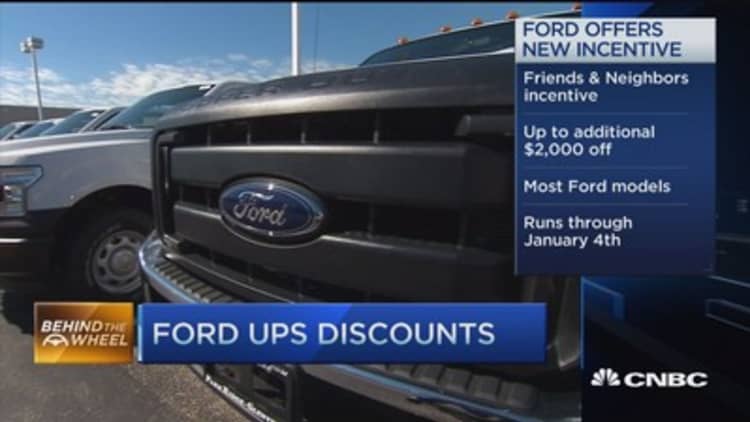
As sales promotions go, Ford's new "Friends & Neighbors" offer is not just another deal. Instead, it's one of the biggest incentive programs an automaker has rolled out since before the recession.
That's why it's sparking such mixed reactions.
On one hand, Ford dealers are excited that the discount will spark strong demand and year-end sales. On the flip side, some analysts are wondering if the move will push automakers to repeat mistakes they made 10 years ago, when they cut prices so dramatically that it destroyed their profitability.
Here are the details, according to information obtained by CNBC from a dealer: Starting Tuesday, Ford's "Friends & Neighbors" offer will knock off up to 10 percent from a new model's manufacturer's suggested retail price.
While the discount varies by model, it generally comes within approximately $200 of the invoice price paid by dealers. But the real kicker is that the offer can be tacked on to other incentives, allowing buyers to get some of the largest discounts seen in years.
"We haven't seen a program like this in quite some time," said Jeff Schuster, an analyst at consulting firm LMC Automotive. "It will be interesting to see how others respond to this."
In October, the average incentive at dealerships in the U.S. was $3,104, up 14.1 percent compared to a year ago, according to TrueCar. The consulting firm said Ford's average discount last month totaled $3,671.
The deal comes as Ford, which is not commenting on news of the pending promotion, tries to recover some of its market share. This year, its share of the U.S. market is 15.1 percent; that's flat compared to 2014, but down slightly from two years ago.
Meanwhile, the automaker is coming off record quarterly earnings with profit margins in North America improving to top 11 percent, meaning it has the money to invest in its attempt to spur further sales.
But not everyone is sure Ford's move is a good one for the auto industry.
RBC Capital's Joe Spak, for one, sounded a note of caution in a research note, writing: "What happens if competitors see what Ford is doing works? It's a slippery slope down to the old view that as volume stalls, incentives rise."
So far, General Motors, Toyota and Chrysler, have not indicated if they'll match Ford's aggressive promotions. But Schuster said he wouldn't be surprised if they eventually respond with sweeter deals of their own.
"I suspect GM and Chrysler have programs ready to go," he said. "They will wait and see how consumers respond and if this program is a hit, I don't expect to see GM and FCA stand by and just watch Ford grab market share."
Having said that, Schuster pointed out the domestic automakers are far from repeating the mistakes they made 10 years ago, when they pushed bigger and bigger incentives in order to generate sales. Those moves ultimately killed the limited profitability the Big 3 generated in the U.S. between 2004 and 2006.
Back then incentives, as a percentage of the average transaction price (what customers pay at dealership), were running as high as 14 to 15 percent. In October, TrueCar said the average incentive of $3,104 is just 9.5 percent of the average price paid for a new vehicle.
The incentive program could spark stronger sales in November and December. For the year, auto sales in the U.S. are running at close to an all-time high, with the 2015 total expected to be 17.3 million or 17.4 million vehicles.
Questions? Comments? BehindTheWheel@cnbc.com.





